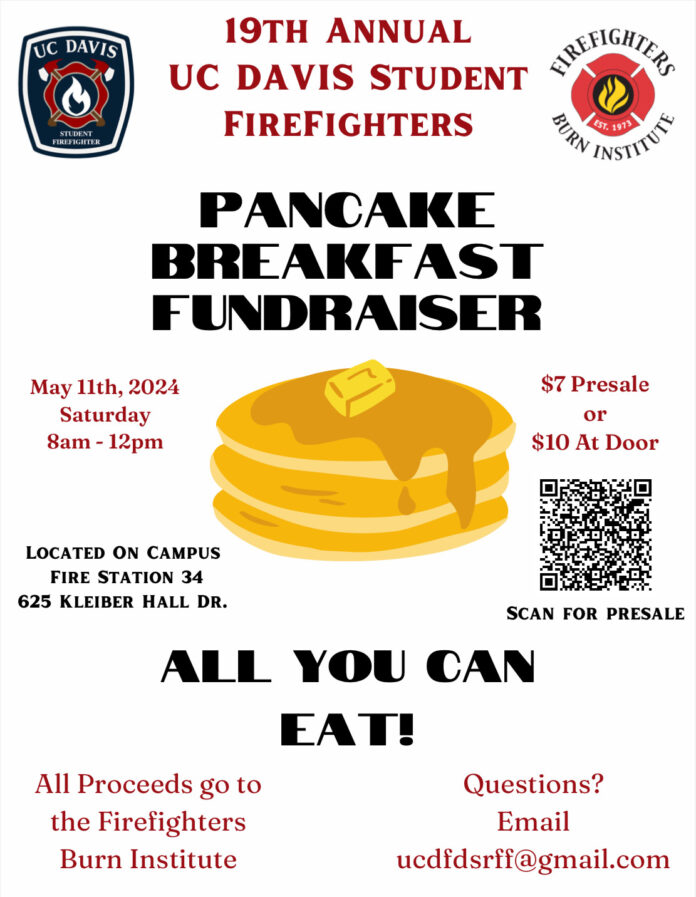The SFF program grants students hands-on experience as emergency responders
By ZOEY MORTAZAVI — features@theaggie.org
On May 11, the UC Davis Student Firefighter program is set to host its annual pancake breakfast event from 8 a.m. to 12 p.m. The event is a way for students, families and community members to gather and donate to the Firefighters Burn Institute, as well as celebrate the program.
The event provides an all-you-can-eat breakfast for $7; all ingredients, food items and coffee are locally sourced from the UC Davis dining commons and companies such as Temple Coffee Roasters, Safeway and Volt Coffee.
Yael Schwarz, a fourth-year sustainable environmental design major and senior student firefighter, explained the pancake breakfast’s tradition and fundraising purpose.
“This will be our 19th annual pancake breakfast event,” Schwarz said. “[It] is run, start-to-finish by student resident firefighters that are currently enrolled in the program. Every dollar that is sent to us for tickets goes directly to the Firefighters Burn Institute in Sacramento. [The Institute] helps burn victims and their families, and ensures that they have the resources they need following traumatic burn injuries. They’re entirely nonprofit and a very cool organization that we’ve been working with for the last 19 years.”
The UC Davis Fire Department, Station 34, was first established in 1917. Originally acting as the UC Berkeley-affiliated farm school, UC Davis created its fire station in response to several fires that were damaging critical infrastructure as the school began to gain popularity. Established in 1949, the Student Firefighter Program (SFF) helped with the transition from students volunteering in the field to careers in firefighting by working as actual emergency responders.
UC Davis student firefighters have the opportunity to train together, live together and work together at Station 34. Connor Flynn, a fifth-year English major and senior student firefighter, expressed that beyond being able to gain valuable skills from the training, he found some of his closest friendships through the program.
“A really big thing for me, aside from the obvious appeal of the certifications and training that the program provides, is that I essentially get to live every single day with my best friends [above] the station,” Flynn said. “Everyone is super driven; I’ve been put into a community that cultivates a really wonderful environment. Everyone is really motivated and supportive — plus, we’re all great friends. We’re always having dinners together and hanging out when we’re not working.”
Students who partake in the program must complete a six-week intensive training academy during the summer. To secure a spot in the program, students must pass a series of tests that take place at the end of the academy. The department also pays for students to receive their EMT license during the spring quarter, which is a prerequisite for the summer academy.
After completing this, students must participate in the following each month in order to receive housing at the station: one 24-hour shift, four 14-hour shifts and two training sessions. Students are financially compensated for all additional work that they complete after these mandatory monthly shifts.
Matilda Hallowell, a third-year human development major and student firefighter, explained what she has gained from working at the station.
“The program provides the opportunity for students to actually prepare themselves for job experience, unlike a lot of on-campus clubs and organizations,” Hallowell said. “Many other on-campus opportunities give students the chance to be an employee, but many don’t provide direct hands-on experience in the field you’re interested in. Being able to actually respond to 911 calls and being able to actually work on an engine is a really unique part of the program.”
Now, over a century since the station’s inception, the program remains intact as a way for interested students to gain hands-on experience fighting fires. Career firefighters are also hired to act as mentors to the students, a tradition that began in 1955. Six to seven career firefighters are always on call at the station and are prepared to help students with any necessary tasks.
Firefighter Gerrit Dykzeul, one of the career firefighters at Station 34, commented on the station’s tight-knit community and the important life skills learned through the program.
“It’s not just about the fire service; it’s building these leadership skills, setting good foundations and preparing us for the world beyond, whether you choose to work in the fire service or not,” Dykzeul said. “It’s also huge to have such a good sense of community and culture that we grant here. It’s very rewarding for me now in a supervisor role; I get to see where these students go, hear good things about them from other departments and see the impact that they make on other students in the community.”
Whether or not you’re interested in becoming a part of the SFF program, consider going out to support them on May 11 at their pancake breakfast event. It encourages community involvement, helps a charitable cause and is a surefire way to get a “taste” of the student firefighter program.
Written by: Zoey Mortazavi — features@theaggie.org




